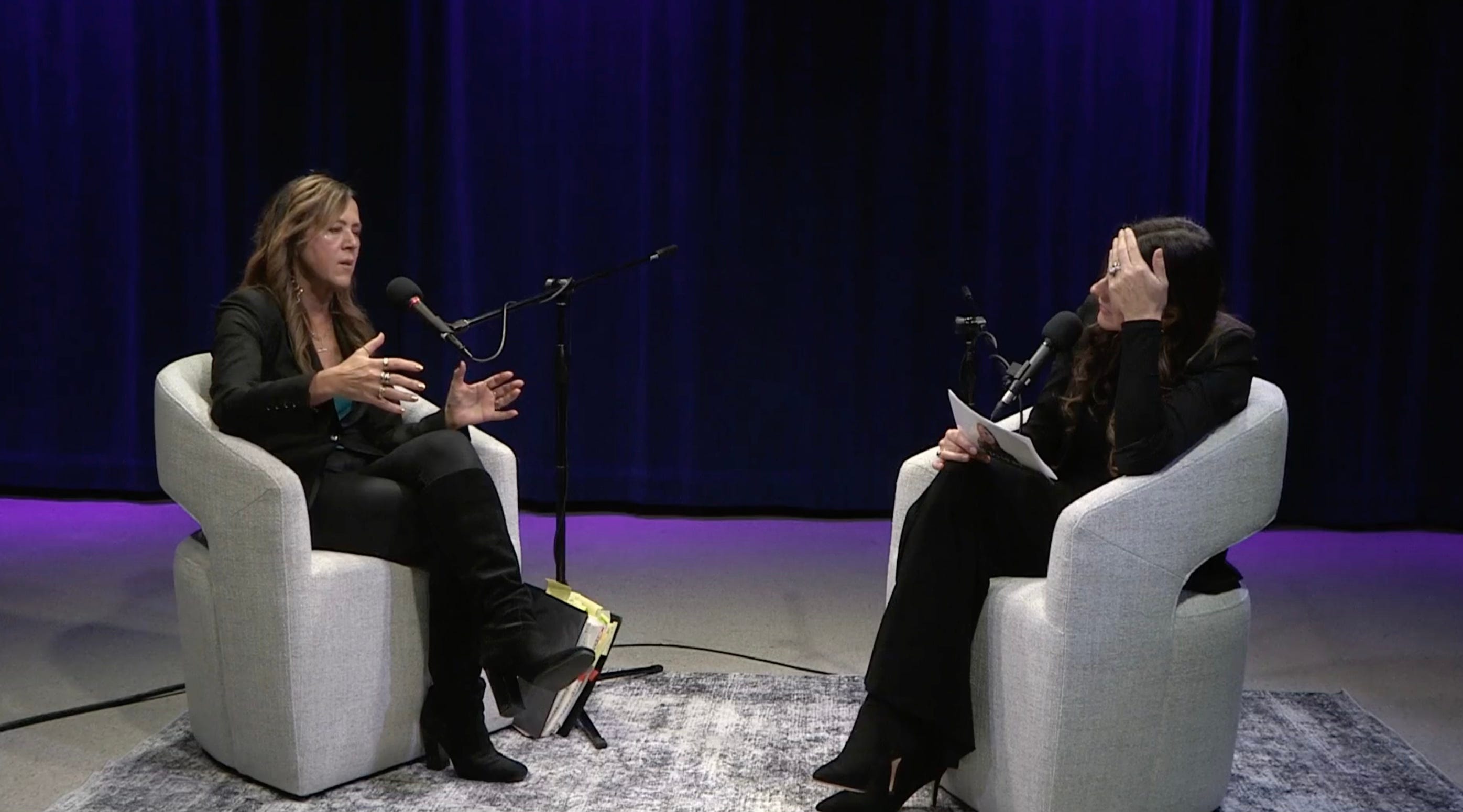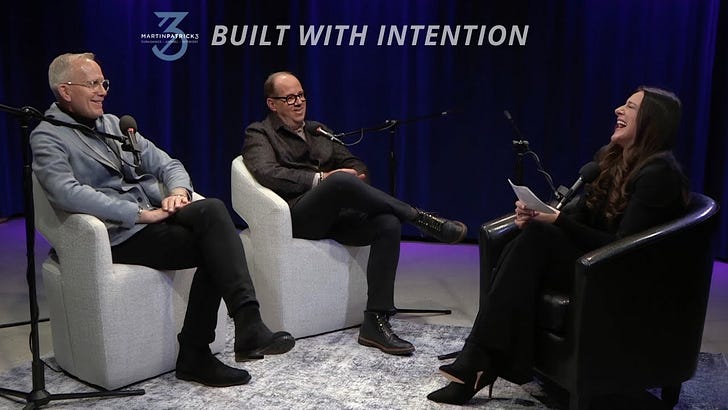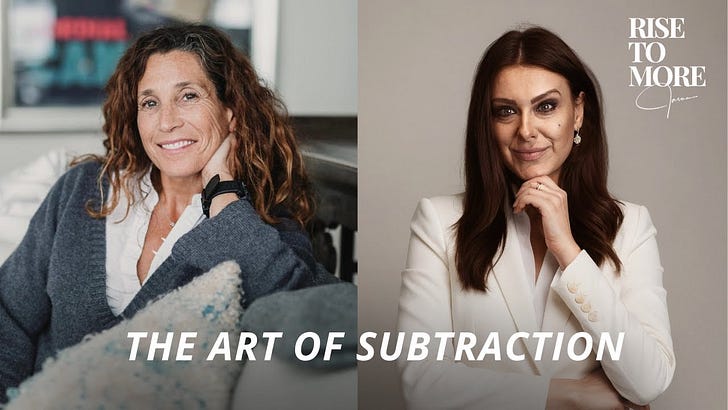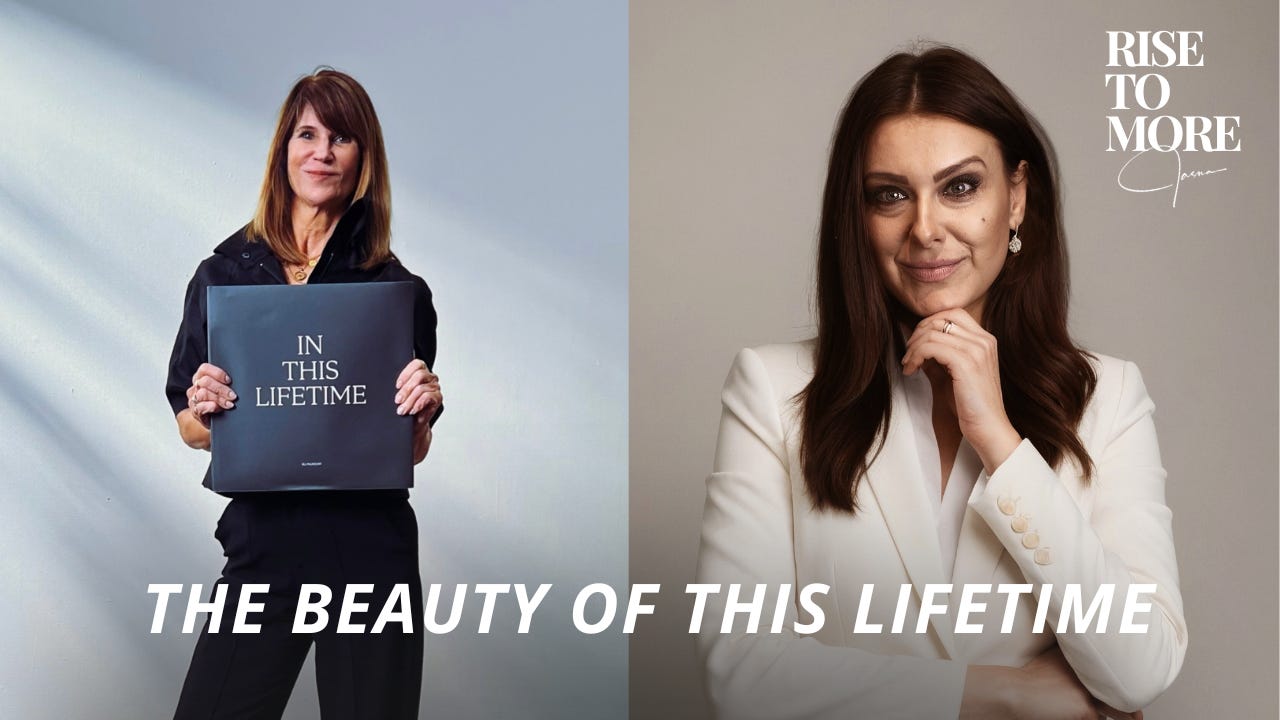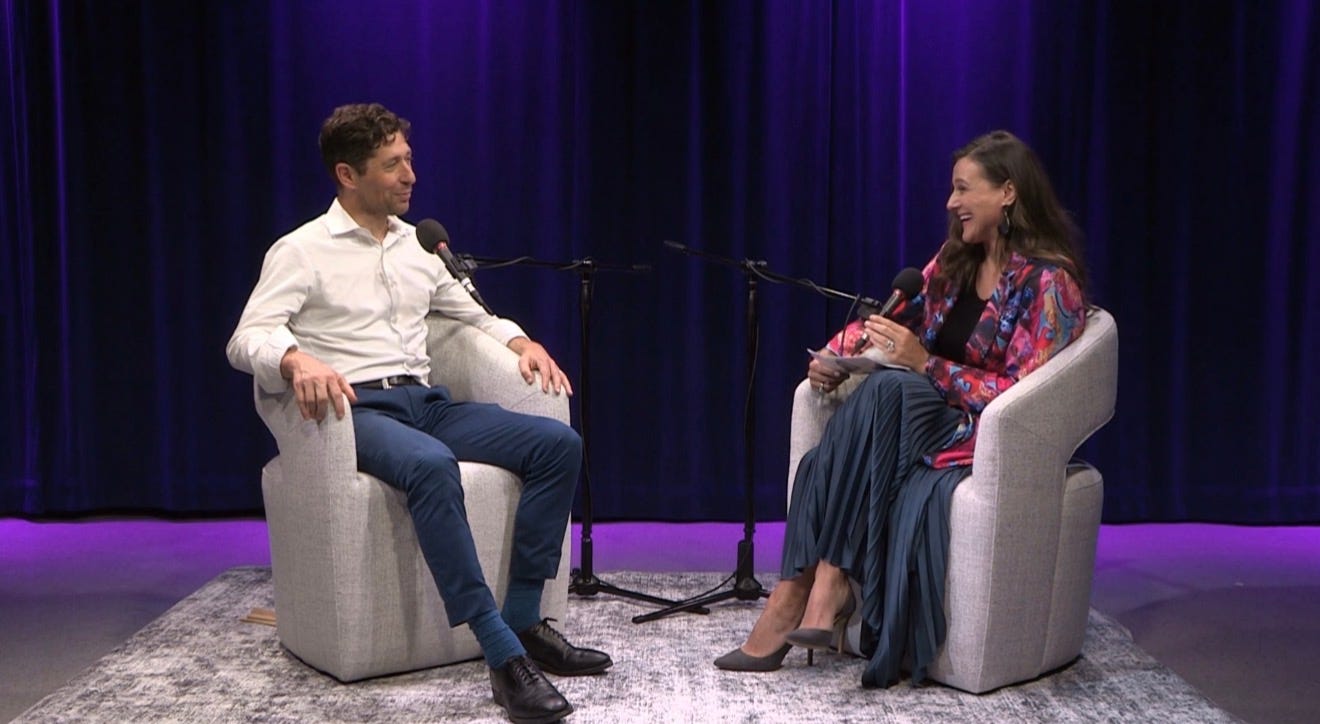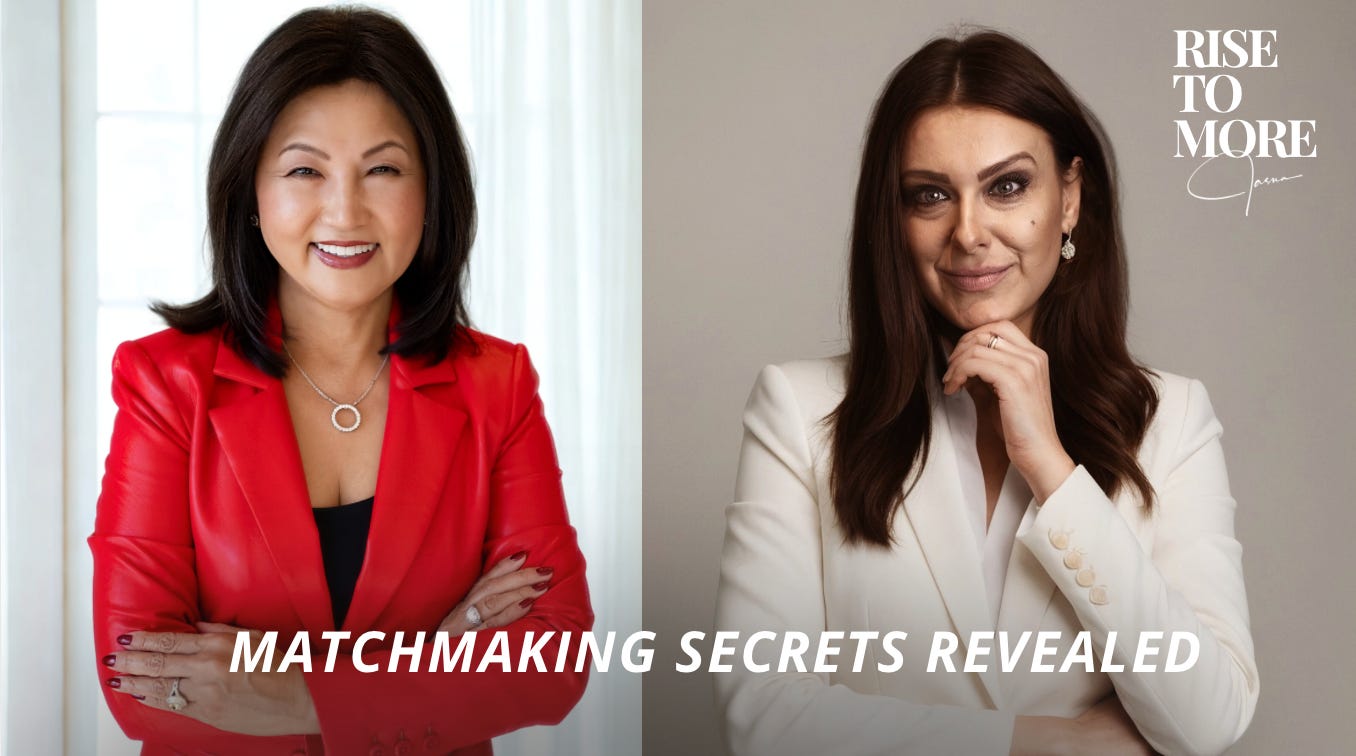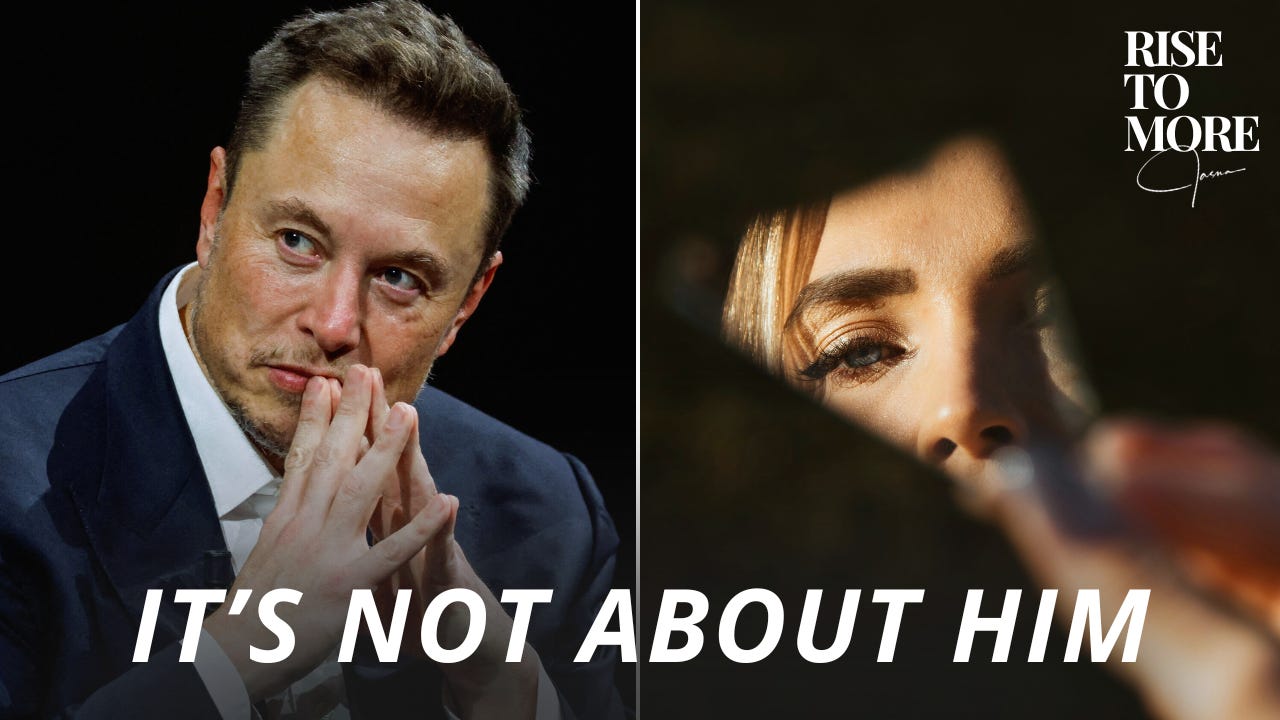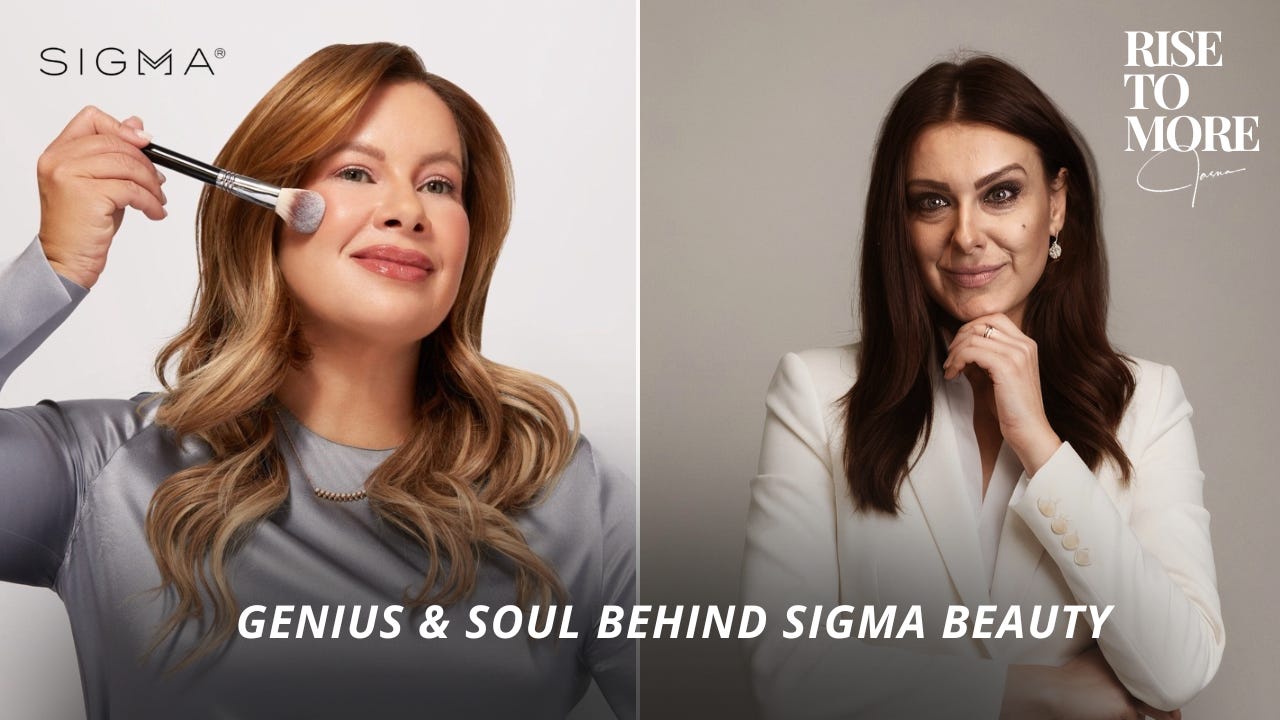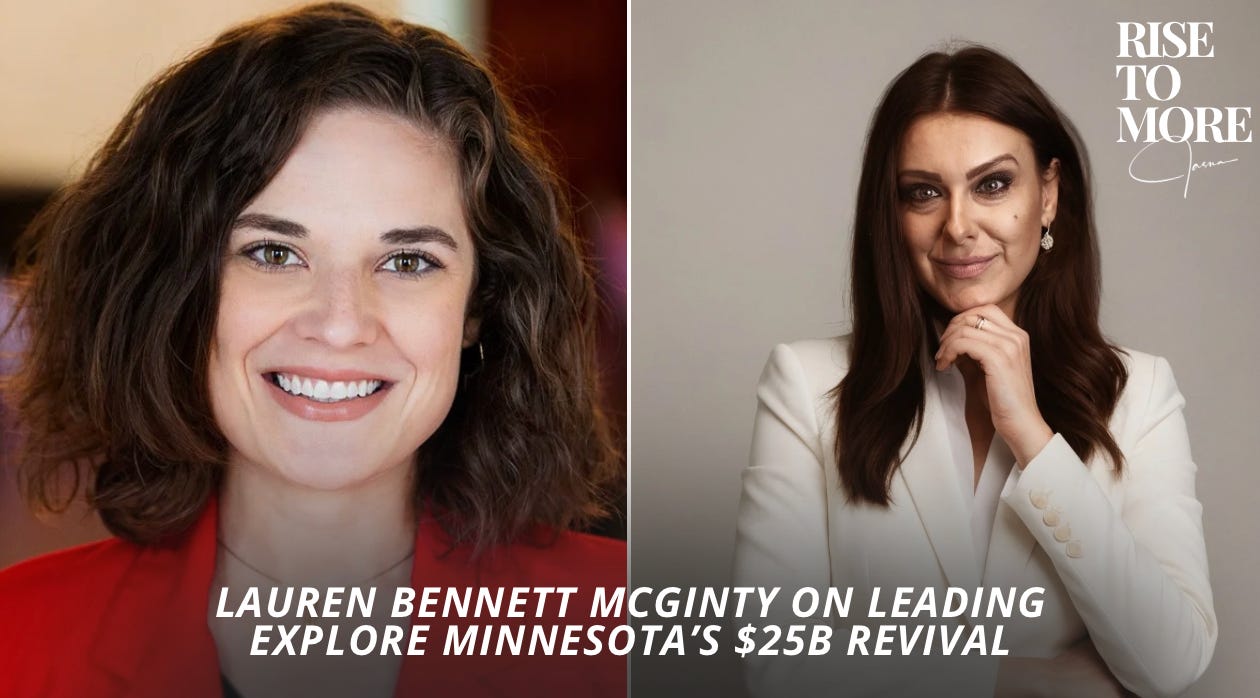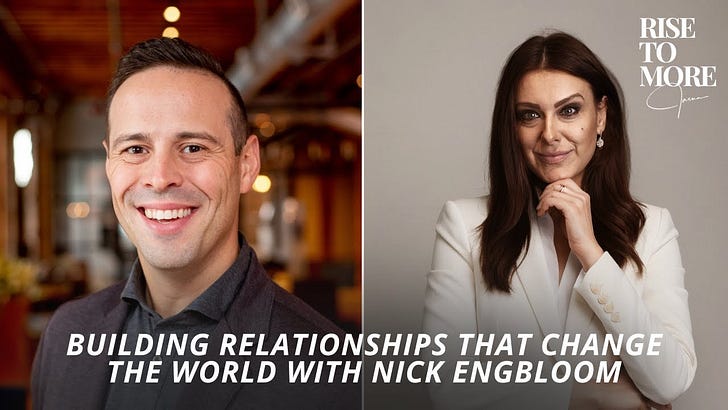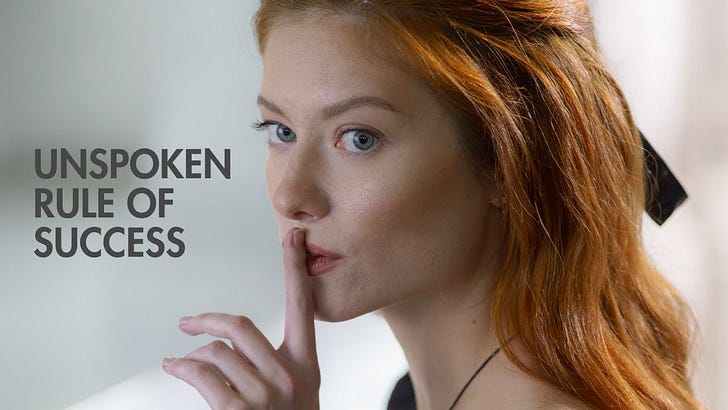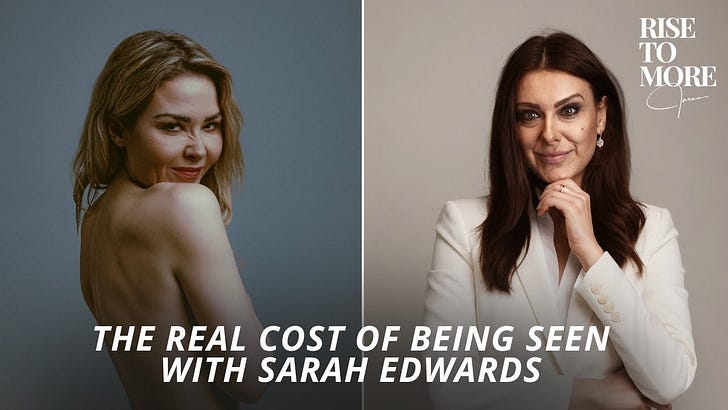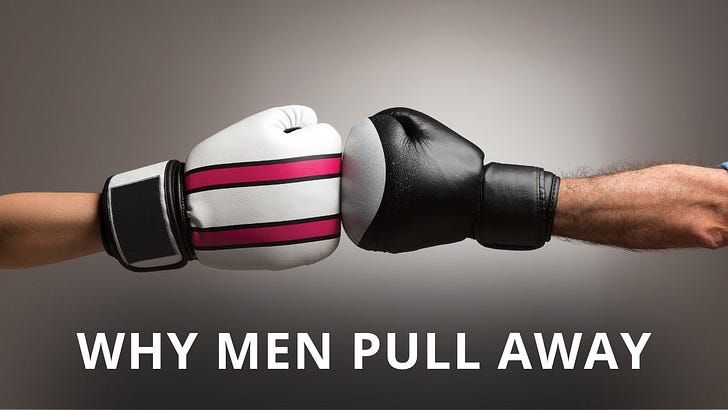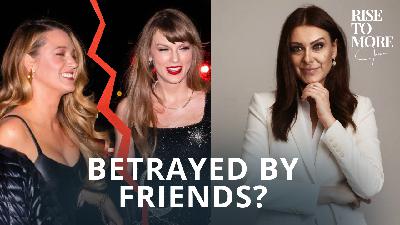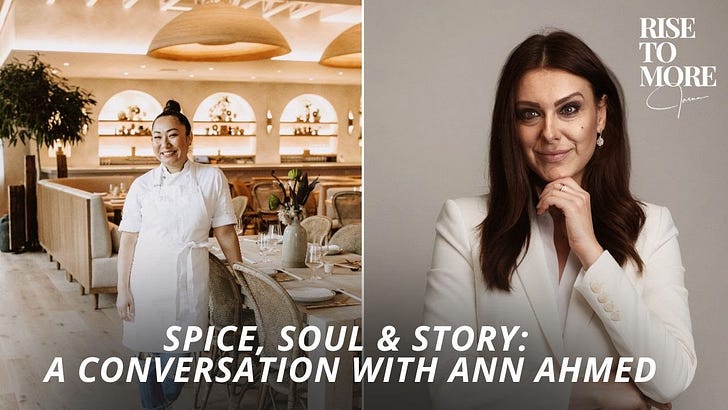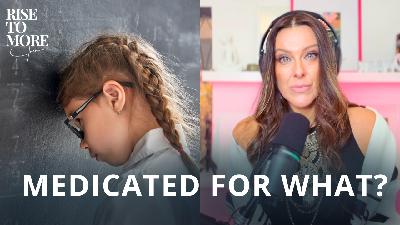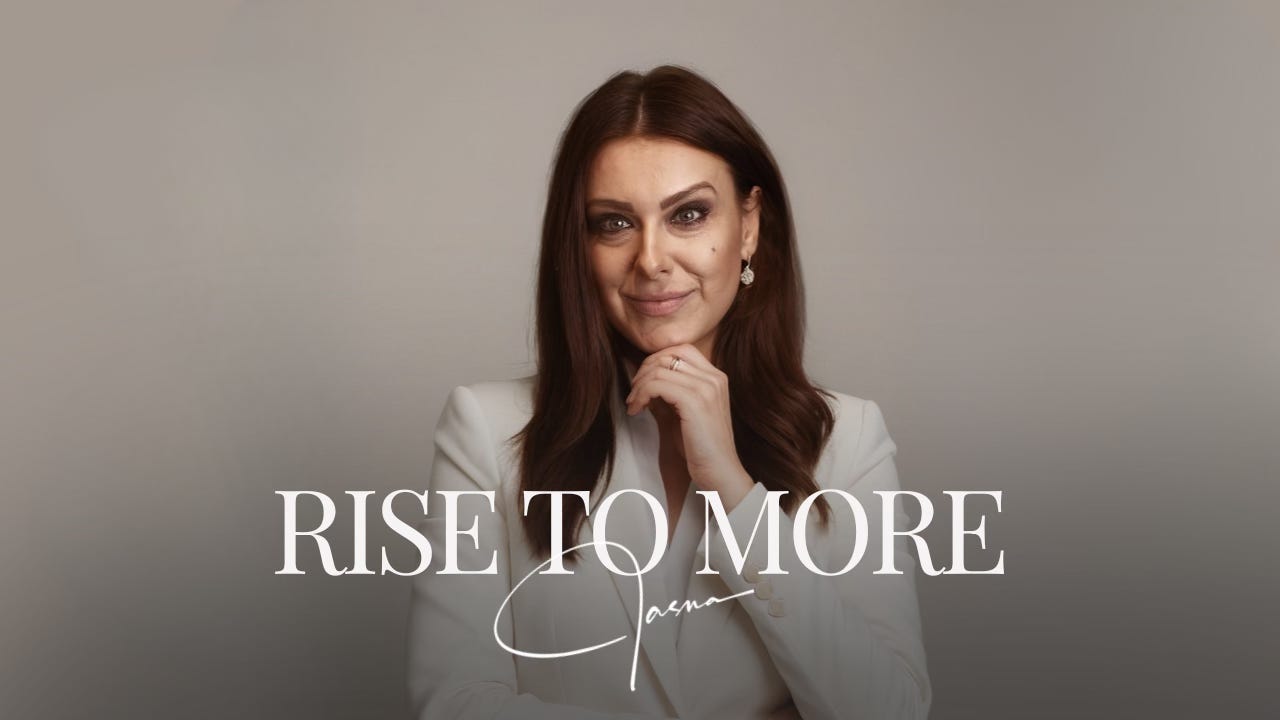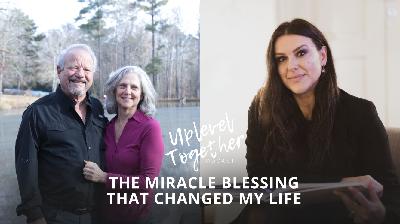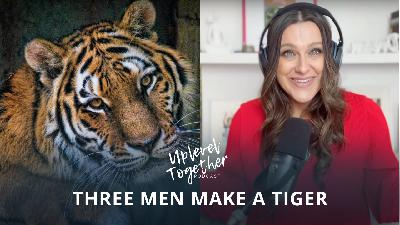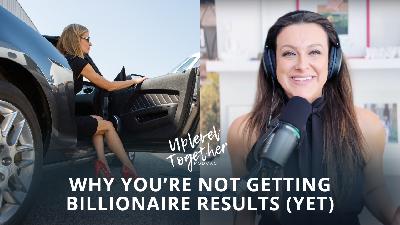Discover Rise To More
Rise To More

Rise To More
Author: Jasna Burza
Subscribed: 16Played: 4,205Subscribe
Share
© Jasna Burza
Description
Welcome to Rise to More—where who you become next is what matters.
I’m Jasna Burza, a war survivor turned advisor to the world’s top minds.
From the wildly successful lost at the top to visionaries chasing more, I’ve helped them elevate. How? Cut the noise. Act with grit. Lead with purpose.
This isn’t just about success—it’s about becoming resilient, grounded and unshakable.
Here, transformation is real, personal, and lasting—and whether you’re leading a company or rebuilding your life…you're ready to…
rise to more.
Come say hi on Instagram @jasna.burza ♥️
Buy book here: https://a.co/d/agOUrzv
Please rate and review the podcast if you enjoy it. Remember, you are the one you have been waiting for.
jasnaburza.substack.com
I’m Jasna Burza, a war survivor turned advisor to the world’s top minds.
From the wildly successful lost at the top to visionaries chasing more, I’ve helped them elevate. How? Cut the noise. Act with grit. Lead with purpose.
This isn’t just about success—it’s about becoming resilient, grounded and unshakable.
Here, transformation is real, personal, and lasting—and whether you’re leading a company or rebuilding your life…you're ready to…
rise to more.
Come say hi on Instagram @jasna.burza ♥️
Buy book here: https://a.co/d/agOUrzv
Please rate and review the podcast if you enjoy it. Remember, you are the one you have been waiting for.
jasnaburza.substack.com
179 Episodes
Reverse
There are certain stories that do not simply inform you — they rearrange you.In 2003, a healthy thirty-seven-year-old man kissed his wife goodnight and went to sleep. He had just begun a dream job at a startup company. He and his wife were planning in vitro treatments to start a family. He was disciplined, responsible, a runner, deeply loved. He did not have a history of depression. He was not spiraling. He was not unraveling. He simply could not sleep.His doctor handed him a three-week sample pack of an antidepressant and assured him it would take the edge off.Five weeks later, he hanged himself in the garage.When Kim Witczak tells this story, she does not speak as a crusader or an ideologue. She speaks as a woman who once trusted. A woman who believed that if something carried serious risk, someone in authority would have warned her. At the time, there were no black box warnings about increased suicide risk during early treatment. There was no public awareness about akathisia — the profound, drug-induced inner agitation that can make a person feel disconnected from their own mind. There was no widespread conversation about off-label prescribing or incomplete clinical transparency. There was only the assumption that prescribed meant safe.When Woody began describing terrifying sensations — “My head feels like it’s outside my body” — neither of them questioned the medication. Why would they? The doctor said it could take four to six weeks to adjust. He was under stress from a new job. Perhaps this was simply part of the transition. Kim recalls coming home from a work trip and finding her husband collapsed on the kitchen floor, drenched in sweat, sobbing because he did not understand what was happening inside his own mind. They prayed. They practiced breathing exercises. They reassured each other it would pass.It did not pass.After his death, a coroner asked whether Woody had been taking any medication. A bottle of Zoloft sat on the kitchen counter. That same day, the front page of the Star Tribune carried an article about a possible link between antidepressants and suicide risk in teens in the United Kingdom. Time, for Kim, split cleanly into before and after.Grief can hollow a person out. It can silence them permanently. Or it can clarify something so fiercely that silence becomes impossible.Kim did not set out to challenge an industry. She was a marketing professional, not an activist. She calls herself an accidental advocate. But as she began researching with her brother-in-law, what they uncovered unsettled them deeply. They learned of earlier FDA hearings in the 1990s that had raised concerns about violence and suicide linked to similar medications. They learned that certain clinical trial data had not been fully visible to the public. They learned about akathisia — described in internal language as a state so unbearable that, for some patients, death could feel like relief. They realized this was not simply a tragic anomaly. It was a pattern that had not been adequately confronted.What followed was not theatrical outrage but disciplined persistence. Kim brought binders of documents to Washington. She testified. She met with regulators who initially regarded stories like hers as isolated incidents. She sat across from pharmaceutical executives and advisory panels while carrying the image of her husband’s final weeks. In 2004 and again in 2006, black box warnings were added to antidepressants for young people, later extended to include those up to age twenty-four. Today, Kim sits on the FDA’s psychopharmacologic advisory committee, participating in discussions about the very medications that once altered the course of her life.What struck me most in our conversation was not anger. It was precision. She is not anti-medicine. She is not arguing that psychiatric medications have no place. She is asking for informed consent. She is asking that patients and families receive full information — benefits and risks — so that decisions are made consciously rather than reflexively. She is asking that doctors slow down long enough to consider whether non-pharmaceutical interventions might be appropriate before reaching for a prescription pad. She is asking that we remember we are not passive recipients of care, but participants in our own health.We live in a time when diagnostic language has expanded rapidly. Ordinary human experiences are increasingly categorized and medicalized. One in five Americans now takes a psychiatric medication. Some of this reflects meaningful progress; mental health conversations are more open than in previous generations. Suffering that was once hidden is now acknowledged. But beneath that progress lies an uncomfortable question: are we more broken, or are we more medicated?After Woody’s death, Kim was offered medication to blunt her grief. She declined. Not because she romanticized pain, but because she understood that numbing it would not restore what had been lost. Pain, she discovered, was not pathology. It was love with nowhere to go. Sitting inside that pain became part of her awakening.This is not an argument against appropriate treatment. There are lives stabilized and saved by psychiatric medication. It is, however, an argument against reflex. Against unquestioned compliance. Against silencing the small inner voice that asks for clarity.Kim often repeats a question that has guided her work for two decades: Why not me? If someone had sounded the alarm earlier, perhaps her story would be different. So she chose to become the person who did.We are living in complex systems where healthcare, regulation, and corporate interests intersect. In such a landscape, the most radical act may not be rebellion, but attention. When something feels off, pause. When a prescription is offered, ask about alternatives and risks. When a diagnosis is suggested, inquire about criteria and long-term implications. When grief or anxiety surfaces, consider what it might be communicating before rushing to silence it.We do not control everything that happens to us. Kim did not choose her husband’s death. But we do choose how awake we remain inside the systems that shape our lives. This conversation is not about telling you what to think. It is about remembering that you are allowed to question, to think critically and feel deeply at the same time, to trust science without abandoning discernment.Intuition is not hysteria. It is not ignorance. Sometimes it is wisdom knocking gently, asking to be heard. Thank you for reading and being part of the conversation. I am forever grateful to Kim for her time and her willingness to not only share her story, but help make the world better because with it. Kim Witczak is a leading global drug safety advocate and speaker with over 25 years professional experience in advocacy, advertising and marketing communications. She is currently a very vocal Consumer Representative on the FDA Advisory committee evaluating new drugs coming to market. Learn more about Kim:https://www.kimwitczak.comhttps://www.woodymatters.comRise To More is a Twin Cities Show rooted in meaningful conversation and real transformation. This Minneapolis self-development podcast offers thoughtful dialogue for listeners who want clarity, confidence, and depth—not hype. Explore one of the most intentional Minnesota podcasts for leaders, entrepreneurs, and seekers ready to rise. This is a public episode. If you would like to discuss this with other subscribers or get access to bonus episodes, visit jasnaburza.substack.com
It started the way so many iconic things do: quietly, improbably, and with no one’s permission. An empty brick warehouse in Minneapolis’ North Loop. Two guys. No investors. No outside money. And a vision that sounded almost absurd in 2008—build the most beautiful store in America. Not a boutique. Not a showroom. Not “retail” the way we’ve been trained to think about it. Something else. Something that felt like the coolest living room you’ve ever stepped into—where a man could find everything: clothing, furniture, art, whiskey, watches, cologne… a whole universe under one roof, curated with taste and intention.Today, that universe has a name: MartinPatrick 3. Forbes called it the hottest retailer in America. It became the most photographed retail space in the Midwest. It survived a recession, expanded in the middle of a pandemic, and still turns away private equity offers. And behind it all are two of my favorite humans: Dana Swindler and Greg Walsh—creatives, builders, business partners, and yes, partners in marriage.This was their first-ever podcast interview, and I felt so honored to hold the room for it. Because what they’ve built isn’t just a store. It’s a statement. A love letter to design and a rebellion against mediocrity. Also, a reminder that in an age of AI, convenience, and endless scrolling, what people truly crave is still the same: beauty, presence, and real human connection.They weren’t chasing “retail.” They were chasing a feeling.When I asked them when they realized MartinPatrick 3 had become something special, Greg said something that made me smile because it explains everything about them: they weren’t watching what everyone else was doing. They were inside their own world—editing, curating, refining. Their compass wasn’t trends. It was taste.They started from design, and they never left it. From the lighting to the books, from the socks to the sectional, everything is chosen with the same question in mind: does this feel beautiful? does it feel right?That’s why the store changes you. I mean it. I’ve told people before—on a hard day, I want to shower, dress up, put on heels, and walk into MartinPatrick 3 just to recalibrate my nervous system. Because beauty has that power. It changes your posture. Your mood. Your sense of self. It reminds you: you’re alive, and you get to decide how you show up today.“We weren’t chasing anything. We were building what felt right—and trusting that people would feel it too.”The part nobody sees: the recession, the fear, the sandwiches.Here’s what I loved most about this conversation: we didn’t romanticize the journey. We told the truth.MartinPatrick 3 opened in October 2008—literally the worst timing imaginable. Everything hit the fan. The economy collapsed. People weren’t shopping. They were surviving. Dana and Greg were surviving too. Dana admitted they put safeguards in the lease—an “out” after 12 months. They didn’t want the liability. They were being careful because they had to be. At one point they even put their house up as bank collateral just to keep the business afloat.And then there were the years no one posts about—years of cutting expenses down to nothing, years of making sandwiches instead of going out to lunch, years of “we do not have room to pretend.”That’s the part I want young entrepreneurs to hear: the truth behind the aesthetic. The truth behind the beautifully lit photos. “We were in survival mode. We cut everything down to nothing—so the business could live.”Dana’s hidden genius: learning the science so the art could survive.Dana is one of the most strategic, fiscally responsible people I’ve ever met—and he earned that wisdom the hard way. He didn’t come from retail. He didn’t come from accounting. He came from engineering and finance-adjacent worlds, and then suddenly he’s managing inventory, sell-through, margins, metrics—things no one teaches you in a way that matters until it’s your money on the line.At one point, their CFO quit (because Dana was asking too many questions). Dana went home, grabbed an accounting textbook, read it over the holidays, and figured it out.That is a lost art: figuring it out instead of collapsing. Curiosity instead of helplessness and true responsibility instead of fantasy. “Retail is art and science. You can have the creative—but you need the numbers for it to work.”Greg’s gift started at 12—and it never left.One of my favorite moments in our friendship happened this summer when Dana showed me something Greg made when he was twelve years old: a model home. Not a “cute little kid project.” An immaculate, deliberate, detailed architectural masterpiece.It explained the whole man. Some people are given a breadcrumb early. A talent that whispers: this is what you’re here to do. Greg didn’t have the internet back then. No Pinterest. No tutorials. He built from memory, exposure, instinct—architecture and finishes recalled from homes he’d seen, then expressed through his hands.And you feel that same instinct in MartinPatrick 3. It’s not just taste. It’s vision. “It wasn’t a hobby. It was a way to be part of the world of design at a scale I could manage.”Risk, but make it intelligent.One thing I respect deeply about Dana and Greg is how they talk about risk without glamorizing recklessness. They don’t do the “jump and the net will appear” fairytale. They’re not gambling. They’re not playing entrepreneur on Instagram.Their risk-taking is calculated, layered, and built in smaller moves. A series of decisions that won’t destroy the whole house if one thing doesn’t work.Dana said something important about younger entrepreneurs today: sometimes they make wildly irresponsible moves because the culture tells them bankruptcy is just a reset button. But anxiety kills creativity. If you’re in financial survival, you stop seeing opportunities. You shrink. You can’t build from panic.“Don’t quit your job to chase an idea that isn’t fleshed out. Show me the numbers. How will you live?”Their real product isn’t clothing. It’s relationship.Here’s what people misunderstand about MartinPatrick 3: they think it’s luxury. They think it’s high-end goods. They think it’s a store.But Greg and Dana were clear: they’re not a transaction. They’re not a “run in, run out” place. Their customers sit. Talk. Stay. Get known. There’s a reason it feels like a private club without the arrogance. It’s personal.And in a world heading toward automation, that becomes the true luxury: being seen.“We’re not a transaction. Our relationships with customers are the point.”The future: AI rises, and so will the hunger for humanity.I asked them what they see coming—with AI, with the decline of brick-and-mortar, with the uncertainty in our culture. Their answers gave me hope.Greg said something I’ve been feeling in my bones: there will be a bucking against technology. People will want what’s real. Touch. Presence. Shared space. Human conversation. A store you can feel. A place you can enter and remember you belong to the living.Dana agreed: AI will help with backend ease—finance, accounting, information. But the relationship part will become more important, not less. Restaurants and bars stay busy for a reason: we want each other.I recently tried a robot massage (yes, I did). It was… fine. Mechanical. Cold. A little eerie. And it made something clear: human touch is going to become the real luxury. “The true luxury won’t be more tech. It will be being together.”Success, in their words.Greg’s definition of success stopped me in my tracks because it was so clean, so grounded: success is doing what he loves, every day, and letting it remain connected to design—the thing he’s been drawn to since childhood.Dana’s definition was equally beautiful, in a different way: success is sustainability. Paying vendors on time. No debt. Taking care of staff. Not living on the edge of payroll. Building something that lasts so you can breathe.“Success is sustainability. Paying people. Taking care of staff. Not living on a treadmill of fear.”A secret you might not know: they built it with their hands.Dana and Greg are elegant, sophisticated, impeccably dressed. But the truth is—part of why MartinPatrick 3 exists is because they physically built it. Wood floors. Painting. Sheetrock. Millwork. Ceilings. Lighting. They did what they couldn’t afford to outsource.And they still love working with their hands. At the lake house, after storms knock down trees, they don’t always hire it out. They pull out chainsaws, split wood, chip branches, build, repair, handle power tools like pros. Not because they have to—but because it resets them. It’s mindfulness without branding and presence without performance.It’s the satisfaction of doing something real and seeing the result.“We’re not doing brain surgery. It can wait.”If you’re anywhere near Minnesota (or honestly, if you’re willing to fly in like so many people do), go experience MartinPatrick 3 in person. Not just to shop—but to feel what it’s like to walk into a space built with taste, courage, and soul.Because what Dana and Greg have built is rare: something beautiful, sustainable, human, and real. And in the world we’re heading into… that might be the most radical thing of all.With gratitude,Jasna____________________________________________________________________________Discover Minneapolis Podcasts That Go Deeper.If you’re searching for a Minneapolis podcast focused on personal growth, leadership, and intentional living, Rise To More is a Twin Cities podcast rooted in meaningful conversation and real transformation. Recorded in Minneapolis, Minnesota, this self-development podcast offers thoughtful dialogue for listeners who want clarity, confidence, and depth—not hype. Explore one of the most intentional Minneapolis podcasts for leaders, entrepreneurs, and seekers ready to rise. This is a public episode. If you would like to discuss this with other subscribers or get access to bonus episodes, visit jasnaburza.substack.com
Thanks for reading! Subscribe for free to receive new posts and support my work.In a world of endless scrolling, relentless news cycles, and the constant hum of “not enough,” what does it really mean to come home to ourselves?That’s the question I explored with my dear friend and spiritual teacher Betsy Weiner in the latest episode of Rise to More. For more than 25 years, Betsy has been guiding others through yoga, meditation, and deep inner work—but what makes her truly remarkable is her ability to blend wisdom with levity. She calls herself a personal trainer for the soul—and after hearing her speak, you’ll understand why.Betsy began by describing what she’s observed in recent years: our collective dysregulation. We are bombarded by information—opinions, outrage, comparison, noise—and in trying to process it all, we lose touch with the one voice that matters: our own. The result? Polarization, anxiety, and a culture that has forgotten how to pause.I write in Healer In Heels: we are so full of the world’s noise, we can no longer hear the whisper of our own soul.And yet, as Betsy reminds us, peace is possible. It begins with what she calls the art of subtraction—the quiet, courageous act of releasing what was never truly ours to carry. The stories, expectations, and burdens we’ve inherited from family, culture, and society weigh us down. The path home isn’t about adding more—it’s about remembering who we are beneath the noise.“You don’t need to add more light. You just need to remove what’s dimming yours.”One of the most radical ideas Betsy offered was this: betterment isn’t always the answer. In a culture obsessed with self-optimization and productivity, she invites us to consider the possibility that this moment—right here, right now—might already be enough. Acceptance, she says, is one of the bravest forms of growth.We also talked about humor—something Betsy uses as sacred medicine. Humor isn’t avoidance; it’s connection. It’s how we remember that joy and pain are not opposites—they coexist. When we laugh, we disarm our defenses and open our hearts.“Laughter is the soul’s way of exhaling.”Of course, no conversation with Betsy would be complete without talking about resilience. She shared with such tenderness about her own experiences with loss and adversity—and how they taught her compassion, grace, and the startling truth that we can love even those who may never love us back. Resilience, she says, is not about never breaking—it’s about breaking open, about rising again softer, truer, and more free.“Resilience isn’t toughness. It’s tenderness that has been tested.”What I love most about Betsy’s wisdom is how grounded it is. She doesn’t ask us to escape our lives or transcend our humanness. She invites us to inhabit it fully—to bring spirit into the small, sacred moments of every day. A morning prayer of gratitude. The silence between deep breaths. The sound of a sparrow outside your window. The stillness of Yoga Nidra.Because in a time when so many feel fractured, Betsy reminds us that spiritual practice isn’t a luxury—it’s a necessity.This conversation was less about finding yourself and more about returning to yourself—the self that was never broken, never behind, never lost.“You don’t have to become whole. You already are.”And maybe that’s the real invitation: to stop trying to fix, improve, or strive our way home. To simply remember that home has been within us all along. Thank you for reading and watching - messages like this one are worth spreading in this crazy world of ours🙏🏼Follow Betsy:IG: https://www.instagram.com/betsylweiner/Work with Betsy: https://betsyweiner.comWith love and presence,JasnaThanks for reading! This post is public so feel free to share it. This is a public episode. If you would like to discuss this with other subscribers or get access to bonus episodes, visit jasnaburza.substack.com
Thanks for reading! Subscribe for free to receive new posts and support my work.What does it mean to live fully—not someday, not when things calm down, not when the stars finally align—but now, in this lifetime? That question sat at the heart of my recent Rise to More conversation with my dear friend, writer, and kindred spirit, Jill Palmquist. Jill’s stunning book, In This Lifetime, is part coffee-table art, part spiritual companion—a love letter to being alive. Through words, photography, and quiet wisdom, she invites us to pause, to breathe, and to ask the questions that truly matter: Why are we here? And what will we do with our time?What I love about Jill is her reverence for the small. She can turn a stray chin hair into poetry. A morning walk into prayer. A shared laugh into a meditation on grace. She reminds us that meaning isn’t something we chase—it’s something we notice. Life’s depth lives not in grand gestures but in micro-moments: sunlight on your coffee, a stranger’s kindness, the warmth of your dog curled at your feet. This isn’t romantic idealism—it’s training your eyes to see. It’s remembering that joy, like air, is always available if we stop long enough to breathe it in.“Meaning isn’t hidden—it’s happening right in front of you.”One of the most profound parts of our conversation was Jill’s distinction between chronos and kairos—two very different ways of living time. Chronos is clock time: the deadlines, the calendars, the never-ending lists. Kairos is sacred time: the eternal moment that lives within every moment, if we have the courage to notice. When we live in kairos, five minutes can stretch into forever. Washing dishes can become worship. A quiet glance across a crowded room can hold the weight of a lifetime. That is how Jill lives. Not rushing toward the next thing, but opening to what is.“When we live in kairos, even five minutes can last a lifetime.”We talked about aging—about learning to make peace with our changing bodies and finding levity in what life offers us. Jill believes humor is one of our most powerful spiritual tools. “If we can’t laugh at ourselves,” she said, “we’re missing the whole point.” In a world obsessed with youth and achievement, she offers a radical antidote: gentleness. What if we wore life, as her father used to say, “like a loose garment”? Letting go. Softening. Making space for joy, for rest, for the messy, miraculous middle.Jill also shared stories of her late father—his wisdom, his laughter, his belief in the power of gathering. He taught her that friendship and joy are not luxuries. They are the very essence of a good life. It made me think of how often we save our best selves for special occasions. What if the special occasion is now?“Stop saving your joy for someday. Someday is happening right now.”This conversation wasn’t theoretical—it was an invitation. A call to reclaim our presence from the chaos. To return to the simplicity of being here. Because living fully isn’t about doing more—it’s about being awake to what’s already happening. It doesn’t take a silent retreat or a life overhaul. Sometimes it’s five mindful minutes in the shower. Sometimes it’s looking out your window and really seeing the light. Sometimes it’s choosing laughter over worry, surrender over striving.As Jill said so beautifully:“In this lifetime, let’s do it all. Let’s move through this world and have a really good time while we’re doing it.”So today, pause. Take a breath. Notice something beautiful right where you are. That’s it. That’s what it means to live—in this lifetime.Follow Jill and read her stories on Substack:IG: https://www.instagram.com/ohthatjillSubstack: jillpalmquist.substack.comBuy her book: https://inthislifetime.lifeWith love and gratitude,Jasna This is a public episode. If you would like to discuss this with other subscribers or get access to bonus episodes, visit jasnaburza.substack.com
When we see public figures, we rarely see the human being. We see a policy, a headline, a viral moment. What we don’t often glimpse is the person—the father fixing his daughter’s tiara, the husband leaning on his wife, the runner who finds peace by railroad tracks after a long day.In my recent Rise to More conversation with Minneapolis Mayor Jacob Frey, I set aside politics entirely. I wanted to know the man behind the title.We live in polarized times. Outrage is the easiest currency to spend. Nuance is rare, compassion rarer. So I wanted to create a different kind of room. A room where we listen for humanity, not ammo. Where we remember we’re far more alike than different. And where transformation—individual and collective—still feels possible.What unfolded was a raw and deeply human conversation about fatherhood, resilience, and the quiet costs of leadership. Jacob spoke openly about being a father of two young girls and how they changed everything: the way he values time, the city he hopes to shape, the example he wants to set.We don’t talk enough about the toll of being known. The loss of breath and private space. The reality that when he steps outside, he is “the mayor” within seconds—no matter if he’s running alone by the railroad tracks or holding his four-year-old’s hand.He also spoke of hardship—moments when he stood firm in his decisions, was publicly shamed, and yet slept peacefully knowing he had done what he believed was right. From those experiences, he described something profound: post-traumatic growth—the ability to not just endure crisis, but to grow from it.We talked about the echo chambers, the easy blame, the brittle certainty. He said something simple and brave: when we’re unhappy, it’s seductive to assign our pain to an “other.” It’s also the beginning of dehumanization.The antidote? Burst your bubble on purpose. Seek people who think, pray, vote, and work differently than you. Have coffee. Share stories. Discover you actually like each other. It’s not naive—it’s necessary. Our nervous systems heal in proximity, not in posts.Topics we covered in this episode:* The perspective shift of fatherhood and raising daughters* How resilience is built in crisis and why “post-traumatic growth” matters* Running as both meditation and emotional release* Jewish tradition and the teaching of the “36 righteous people”* Keeping a soft heart in a hard, polarized world* His personal mantra: Find a way—to lead, to serve, to keep moving forward* What greatness and legacy mean to himWhat I found most moving was Jacob’s candor. He admitted flaws. He spoke of the weight of criticism, the freedom of authenticity, and the small, grounding rituals that keep him human.In the end, this wasn’t an interview about a mayor. It was a conversation with a man navigating the complexity of public life while striving to remain whole.And perhaps that is the lesson for us all: whatever our role, we must find a way. To love, to lead, to soften, to rise. And for the love of God, to see humanity in one another regardless of our differences. Please watch, listen or share. With gratitude,Jasna____________________________________________________________________________Discover Minneapolis Podcasts That Go Deeper.If you’re searching for a Minneapolis podcast focused on personal growth, leadership, and intentional living, Rise To More is a Twin Cities podcast rooted in meaningful conversation and real transformation. Recorded in Minneapolis, Minnesota, this self-development podcast offers thoughtful dialogue for listeners who want clarity, confidence, and depth—not hype. Explore one of the most intentional Minneapolis podcasts for leaders, entrepreneurs, and seekers ready to rise.Thanks for reading! This post is public so feel free to share it. This is a public episode. If you would like to discuss this with other subscribers or get access to bonus episodes, visit jasnaburza.substack.com
Thanks for reading! Subscribe for free to receive new posts and support my work.I believe love is the most powerful force in the world. It steadies us. It expands us. It’s the one thing success can’t replace.That’s why today’s story matters.I brought my dear friend and now business partner, Julie Spangler, onto Rise to More because she’s quietly changed thousands of lives—with a craft most people dismiss until they’re exhausted enough to admit they need it: high-end matchmaking.Julie spent 20+ years in corporate America (HR and marketing at major financial institutions), always with an eye for people. Connecting wasn’t a job; it was her reflex. In 2012, she did the unthinkable: walked away from the safe path and built a matchmaking firm grounded in values—privacy, discernment, and real care.Years later, I joined her as co-owner of Selective Connections because what she does is rare—and it works.Why apps are failing serious peopleDating apps had their moment. For many professionals, that moment is over. The swipe culture rewards speed, not sincerity. It’s instant gratification dressed up as connection. It leaves people lonelier and more guarded than before.The clients we serve can’t risk their privacy, their reputation, or their time. They outsource everything that matters—legal, finance, health. Why wouldn’t they bring in an expert for the most important decision of their life?What makes this differentJulie’s approach isn’t a numbers game. It’s deeply personal and fiercely intentional.* White-glove, not wild guesses. Every client goes through a thorough, human process. Interviews. Coaching. A bespoke profile crafted with professional photography. Alignment on values, lifestyle, non-negotiables.* Curated candidates. She meets, screens, and runs background checks on everyone in the ecosystem. Many arrive by referral. No randos. No mystery motives.* You choose. She presents a slate of excellent fits with the why behind each one. Both people opt in. No blind collisions.* Intuition with data. This is where she shines. The strategy is tight. The instincts are world-class. I’ve watched her connect two people before their paperwork was finished—and they were on a plane together a week later.And then there’s the part you won’t see on a website: men crying on the phone because someone finally helped them find their person. Widows in their 50s who thought love had passed them by—now planning a second act with a partner who gets it. Those calls matter.The thing no one tells you about “chemistry”We’ve been sold a movie montage. Fireworks. Sparks. Epic grand gestures. Here’s the truth: many of Julie’s strongest matches started as “meh” first dates.Sparks fizzle. The slow burn endures.First dates are awkward. Nerves can masquerade as “no spark.” The best relationships often come from a second or third date—where two people relax long enough to show who they really are. Compatibility, kindness, shared values, similar pace of life—these are the building blocks of a relationship that survives career pivots, illness, kids, and ordinary Tuesday nights.What men and women get wrong* Women: a 50-item checklist and a demand for instant fireworks. The right man may not arrive with cinematic flair. He might arrive as stability, respect, and consistent pursuit.* Men: underestimating how much warmth and kindness matter. The trait men consistently name as most attractive inside our process? Kindness.Both: stop trying to win the first hour. Learn if this person can be your friend, your sanctuary, your mirror—over time.Readiness matters more than resumeA lot of our clients have crushed every other area of life. That doesn’t mean something’s “wrong” because love hasn’t landed yet. It often means they built the career first and finally made space for the relationship.Readiness looks like this:* Willing to be seen and to listen.* Open to being coached.* Willing to date with curiosity, not cynicism.* Clear on values; flexible on packaging.If you’re resigned and bitter, that’s a different project. Hope is not naïve. It’s the door you walk through.Integrity is the lineThis industry, like coaching, attracts both healers and hustlers. We see the damage from the latter. Here’s where we stand:* No clients who are separated or married. Period.* We pass on people who don’t align with our values—even if they can pay.* We protect privacy like a sacred trust.* We say the hard thing when it’s the right thing.That’s why clients from twelve years ago still refer their friends. We sleep well at night.Two ways to work with us1) Private, one-to-one matchmakingWhite-glove, bespoke search. We build your profile, recruit precisely for you, present curated matches you approve, and even arrange first dates. High-touch and highly effective.2) VIP DatabaseA database membership with one guaranteed match drawn from our vetted community, plus the opportunity to be considered for our private clients. It’s $5,000, and for many, it’s the perfect starting point. You only need one right match.If you’re single and seriousStop burning energy on apps that drain you. Stop pretending you don’t care. You do. We all do.Choose the path that aligns with the life you say you want: private, intentional, grown-up, and hopeful.Selective Connections is where we do this work—with discretion and heart. If you’re ready, we’re here.Love is out there. Not the cinematic kind—the real kind. The kind that steadies your nervous system, makes you braver, and turns ordinary into holy.If you felt this, share it with the friend who’s quietly given up. And if you’re ready to be considered for our database or to explore one-to-one, reach out. We’ll treat your story with the dignity it deserves.—JasnaP.S. For the record: I didn’t join this company because it’s trendy. I joined because I watched Julie do the right thing when no one was looking. That’s who you want handling your heart.Thanks for reading! This post is public so feel free to share it. This is a public episode. If you would like to discuss this with other subscribers or get access to bonus episodes, visit jasnaburza.substack.com
We love to watch people rise.We cheer for the underdog, admire their grit, and celebrate their early wins. But the moment they cross into real success—the kind that sets them apart—something shifts. Suddenly, we start picking them apart. We look for cracks, mistakes, scandals. We whisper, “Who do they think they are?”Elon Musk is maybe a tricky example—because let’s face it, the man is as controversial as they come. But here’s the truth: people were tearing him down long before politics, Twitter wars, or hot takes. And this isn’t about him—it’s about us (I had to get your attention somehow. hello?). If you find yourself triggered by every little thing and unable to hold a rational conversation, that’s exactly why you need to keep reading. Because what we hate in others often reveals the very thing we’re avoiding in ourselves.It doesn’t matter if they’re creating jobs, donating millions, or solving real problems. We’ll still find a reason to drag them down.And here’s the truth no one likes to admit: that criticism says more about us than it does about them.Why We Tear People DownPsychologists call it status inconsistency resentment—the discomfort we feel when someone climbs the social or financial ladder faster than we think they “should.” We love when people are scrappy and struggling, because it makes us believe we could do it too. But when they’re wildly successful? We stop seeing them as one of us, and start seeing them as above us.That comparison stings. Because if they made it, maybe it’s not luck. Maybe it’s choices. And sitting with that reality is uncomfortable.So instead of facing our own lack of progress, we attack. We discredit. We gossip. We convince ourselves they were lucky, connected, or corrupt. That way, we don’t have to ask hard questions like:* Why haven’t I taken more risks?* What’s stopping me from building something greater?* Where am I still playing small?Here’s the pattern I’ve noticed again and again:People attack what they secretly wish they had.Envy is the ego’s shield. Think about it:* The person mocking a billionaire’s spending often struggles to pay their own bills.* The person tearing down an author’s bestseller hasn’t written a single page.* The person criticizing someone else’s confidence usually wishes they had more of their own.We critique what we crave. And every minute we spend doing that is a minute we’re not building, creating, or rising.But we can actually do something about thisIf you’re tired of wasting your energy tearing others down, here’s how to redirect it:1. Catch yourself.The next time you feel the urge to criticize someone’s success, pause. Ask: Am I really analyzing their choices—or just projecting my frustration?2. Study instead of dismiss.Every successful person knows something you don’t. What mindset did they adopt? What risks did they take? What can you learn from their story?3. Use discomfort as a mirror.If someone’s wealth, boldness, or confidence makes you uneasy, ask: Why? That’s your clue. The trigger often reveals what you actually want for yourself.4. Take one bold action.Instead of gossiping about what others have accomplished, write down one uncomfortable, needle-moving step you can take today toward your own rise.Here’s the Bigger Truth:When you get close to highly successful people, you see what it really takes: mindset work, risk-taking, relentless effort, resilience. Nothing magical. Just one step at a time.And once you see that, envy fades. You realize they’re not untouchable—they’re proof that it’s possible.And I am not talking we should we looking up to ALL successful people - people that we don’t like, sociopaths or world leaders who love to play war. Think more generally about instances in which we are triggered for no reason…..by friends and associated who suddenly pass you by….The question is: will you let their rise inspire you or threaten you?Because envy will keep you small. But turning frustration into fuel? That will change everything.So my challenge to you is simple:Stop tearing others down. Start building yourself up.You’ll be amazed at what happens when you trade bitterness for boldness.Because when you rise to more, you don’t just elevate yourself—you give others permission to rise too.Make sure you subscribe to RISE TO MORE podcast on audio platforms so you never miss an episode. This is a public episode. If you would like to discuss this with other subscribers or get access to bonus episodes, visit jasnaburza.substack.com
Today’s guest on Rise to More completely blew my mind. Dr. Simone Xavier isn't just another entrepreneur—she is one of the most remarkable minds behind one of the world’s biggest makeup brands, Sigma Beauty.When I first heard her story—a veterinarian, infectious disease researcher, and professor who pivoted into beauty—I was fascinated. How does someone go from vaccines and bacterial diagnostics to building a global cosmetic brand?As Simone revealed to me, it began very simply: with curiosity, intuition, and solving a problem. Simone and her engineer husband René had zero experience in beauty, yet found themselves bringing makeup brushes from the US to their friends and family in Brazil. René, noticing he could make better brushes himself, said, “I can do this better, cheaper.” And that’s how Sigma Beauty was born.Seventeen years later, Sigma Beauty is everywhere—from Nordstrom to Neiman Marcus, from boutiques to Sephora shelves. But Simone didn't start by setting out to build a multi-million-dollar brand. She started by wanting better tools for herself. The first set of Sigma brushes—which Simone meticulously researched from YouTube makeup tutorials—sold out immediately, catapulting the brand overnight.What moved me deeply during our conversation was Simone’s gentle yet powerful wisdom. She said simply, yet profoundly:“I don't try to beat anyone. I want to inspire myself, inspire others. Everything I do is service, solving problems, bringing beauty and simplicity.”We talked openly about her transition from a respected academic career to entrepreneurship. Simone admits the pivot felt natural, not fearful—she followed excitement, trust, and flow. Her research background empowered her to innovate in beauty, resulting in over 60 patents. From waterproof brushes to specialized cleaning tools, every Sigma product is deeply intentional—crafted with science, innovation, and love.But what truly sets Simone apart isn’t just her trailblazing business savvy or her 60+ patents in the beauty space. It’s her soul.There was something deeper we discussed, too—Simone’s spiritual awakening. Her voice softened as she confessed, “I've never talked publicly about this.” She revealed that 2020 marked a profound shift, deepening her understanding of connectedness, quantum physics, and the power of visualization. She shared something I've always felt in my bones:“I believe everyone is a mirror of myself. My energy matters. What I visualize manifests. I truly believe we create our reality.”When I asked what “Rise to More” meant to her, Simone smiled gently:“It means showing up authentically, consciously. Inspiring others, but staying humble, present, and true.”Our conversation went beyond makeup and patents. We touched upon what it means to truly live authentically, consciously, and intentionally in a rapidly changing world.Simone reminds us all that great success isn't about recognition or money—it's about fulfillment, genuine service, and staying deeply connected to our truth. Her brilliance, creativity, and heart are evident in everything she creates.I hope Simone’s story lights something within you today—the possibility to pivot, innovate, and trust in your innate genius. We don’t have to chase success blindly; instead, let’s create joyfully, solve meaningful problems, and live consciously, intentionally connected.Because when we rise consciously, the world rises with us. Simone, that was a moment I will never forget. That day in the studio, I met a new friend. Thank you for your heart. Check out Sigma Beauty: https://sigmabeauty.comFollow Dr Xavier on LinkedIn HERE This is a public episode. If you would like to discuss this with other subscribers or get access to bonus episodes, visit jasnaburza.substack.com
Lauren Bennett McGinty on Leading Explore Minnesota’s $25B RevivalWhen you think of transformative leadership, you might not immediately think of tourism. But Lauren Bennett McGinty is here to change that.As the Executive Director of Explore Minnesota, Lauren has taken the reins of a $25 billion industry in a state recovering from global disruption, cultural shifts, and long-standing misconceptions. Her work isn’t just about promoting lakes and cabins—it’s about elevating the spirit of a place. It’s about reminding us what joy, belonging, and visibility can do for an entire state’s identity. This conversation reaffirmed how blessed I am to be living in Minnesota and why I love it here so much. Minnesota attracts nearly 90 million visitors every year, bringing nearly $25 billion into our economy. From our incredible arts and culture scene to our award-winning chefs, pristine lakes, and endless forests, Minnesota quietly holds everything the soul needs to reconnect and recharge. And that matters as Lauren tells us that we are the least stressed state in the country!!Lauren's role isn’t just a marketing job—it’s a mission. After COVID brought an economic loss of billions, her team stepped in to revive hope and connection, promoting local businesses, state parks, and hidden gems. But at the heart of it, Lauren reminded me, "It's about inviting people into what we already know is special. It's about feeling at home wherever you go."What touched me most about our conversation wasn’t just the incredible statistics or Lauren’s undeniable passion—it was her heart and humility. When I asked her how she manages criticism, she paused and said quietly:“When someone’s upset, I first ask myself: Why? What pain or fear might they be feeling? If I can start from empathy and understanding, we both rise.”Lauren shows us the kind of leader we need more of—one who listens deeply, leads compassionately, and seeks common ground, even in polarizing times.Toward the end, I asked Lauren, "What does Rise to More mean to you?" Her eyes sparkled as she said:“It means stepping beyond expectations others have of you—especially if you're underestimated. It means showing up again and again because you believe in something greater.”I left our conversation deeply inspired, feeling lucky not just to call Minnesota my home, but to know someone like Lauren is advocating for it with passion, grace, and vision.So, my friends—perhaps Minnesota has never crossed your mind as a must-visit spot. But perhaps it’s time it did. Take Lauren’s challenge—discover it for yourself, invite your friends, share the hidden beauty.As Lauren put it beautifully:“Travel is more than seeing new places—it’s discovering who we are and what connects us.”And Minnesota? It turns out, it's exactly where many of us have been longing to go all along.Time to explore MN at https://www.exploreminnesota.com and follow Lauren on Linkedin HERE. This is a public episode. If you would like to discuss this with other subscribers or get access to bonus episodes, visit jasnaburza.substack.com
Sometimes, the most powerful voices are the quiet ones. The people who don't speak to be heard—but to serve. Today's Rise to More guest, Nick Engbloom, is exactly that kind of quiet powerhouse. Nick is Senior Director of Development at the University of Minnesota Foundation, and just this year - he was recognized as part of the Minneapolis/St. Paul Business Journal (MSPBJ) 40 Under 40. He’s quietly raised hundreds of millions of dollars for life-changing causes like the Masonic Children's Hospital and created attention behind Special Olympics coming to Minnesota. But it isn't the money or the big numbers that set him apart—it's the heart behind it.From a young age, Nick learned advocacy through necessity. Growing up with a brother who has Down syndrome, he saw firsthand how the world often overlooks or underestimates people who deserve to be seen. What began as love and protection for his brother grew into a lifelong mission: giving voice to the voiceless.And he does this not through "fundraising," but what he calls "friendraising"—the simple, powerful act of creating genuine human connections. Nick doesn't start with the ask; he starts with understanding. Curiosity. Real relationship-building. He leads with his heart, trusting that generosity naturally follows connection.Listening to him reminded me of something so profound: change isn’t transactional. It’s relational. The biggest impacts often come from quietly cultivating trust, empathy, and genuine partnership. Nick shared powerful stories of moments when major donors pulled away, yet deeper partnerships emerged—creating even greater impact than he first imagined.Even his personal love story is woven through giving—he met his wife while giving her a tour of the children’s hospital. Because true generosity has a way of bringing the right people together.What struck me most was Nick’s perspective on legacy. He doesn't want titles or acclaim. He simply hopes people remember him as someone who "did good," who served wholeheartedly and left every interaction a little kinder, stronger, better.He asked us all one simple yet profound question:"How can I be of service?"Because rising to more isn’t about ambition alone—it's about generosity. It’s about lifting others as you climb, creating ripples of kindness and humanity that long outlive your name.This conversation felt like a gentle, powerful invitation to examine how we show up every day. It left me wondering: How can each of us quietly, consistently, powerfully serve our communities and build connections that matter?If you're seeking a reminder of what true leadership and heart-centered impact look like, this conversation with Nick is it.Here's to “friendraising”, heart-leading, and quietly changing the world, one meaningful connection at a time.And Nick and I talk about Special Olympics coming to MN and how we all need to show up and help to make it a success. And lastly, Nick is a creative entrepreneur with many interests and one of those is auctioneering - so he did his best and put RISE TO MORE podcast appearance up for bids live on the show:)Follow Nick on Linkedin: https://www.linkedin.com/in/nicholas-engbloom-52303b10/Nick’s Auction Crasher website: https://www.auctioncrasher.comSupport Special Olympics: https://2026specialolympicsusagames.org This is a public episode. If you would like to discuss this with other subscribers or get access to bonus episodes, visit jasnaburza.substack.com
Recently, I recorded an episode of Rise to More that tackles something I've noticed again and again among incredibly talented, driven people: the unconscious habit of sabotaging their own success.We all know someone (maybe even ourselves) who wants so badly to succeed that every interaction becomes transactional. It becomes all about "me": my job, my promotion, my next opportunity. They reach out only when they want something. The doors they're banging on somehow stay locked.Here's the truth, my friends: Success doesn't flow toward those who only take—it flows toward those who give.And this isn't just a feel-good cliché—it's proven science. The brilliant Adam Grant, in his groundbreaking research, showed unequivocally that the most successful people across every industry are not the takers, nor even the matchers—they’re the givers. They’re the ones who consistently and authentically help others rise. But there's an important nuance: these givers aren't naïve. They practice what Grant calls strategic generosity.The Real Power of GivingWhen you make the shift from taking to giving, you're working in alignment with the universal law of reciprocity—the fundamental, scientifically proven principle that humans feel compelled to return kindness, generosity, and help.But this isn't about manipulating outcomes. It’s about genuine generosity. I deeply believe generosity is spiritual: it connects us to a force greater than ourselves. When my husband and I chose service as our way of life, our world changed dramatically. We didn't always get back directly from where we gave—but blessings returned abundantly, from unexpected directions, multiplied tenfold.Four Simple Ways to Become an Intentional Giver:* Lead with Value:Always ask yourself, "How can I make someone else's day easier or brighter?" Offer your skills, insights, or encouragement first, before ever making an ask.* Notice Needs:Pay close attention to those around you. Who needs support, guidance, encouragement, or connection? Become the one who notices and acts.* Think Like a Connector:Introduce people, opportunities, and resources to each other without expecting immediate return. Connect good people to good opportunities—just because you can.* Play the Long Game:True success comes from genuine relationships cultivated over time. Invest in people. Trust in the process. Generosity pays off, often when you least expect it.The ChallengeHere's my simple challenge to you today: Give without expectation. Reach out, not because you need something, but because you can help. Call someone to ask how you can support them. Offer advice, resources, or encouragement freely.When you truly embody generosity, your whole perspective shifts. Doors open naturally—not because you kicked them down, but because people genuinely want to open them for you.Because at the end of the day, rising to more is never just about you. It's about all the people you lift and inspire along the way.With love,Jasna This is a public episode. If you would like to discuss this with other subscribers or get access to bonus episodes, visit jasnaburza.substack.com
There’s this story we tell about visibility: Build something amazing. Gather a big following. Get celebrated. Feel fulfilled.But what happens when the story turns?In one of the most raw, vulnerable conversations I've had on the Rise to More podcast, creative entrepreneur Sarah Edwards pulls back the curtain on what success and public visibility can truly cost.If you’ve lived in Minneapolis, you've probably heard Sarah’s name. She created the beloved I AM MPLS and co-founded Fashion Week Minnesota, crafting spaces for creativity, inclusivity, and vibrant connection. From the outside, it looked glamorous, inspiring—effortless.But what most didn't see was the human behind the brand. Sarah’s truth is much messier, more beautiful, and more complex than a polished highlight reel.When Sarah began, she didn't set out to be an influencer or a public figure. She simply saw connections others didn't and followed her heart. She championed inclusivity and brought people together with genuine intention. But visibility brought expectations—and eventually criticism.In our conversation, Sarah bravely confronts the darker side of public life. She shares about the relentless people-pleasing, the overwhelm of endless demands, and the loneliness of feeling profoundly misunderstood. She admits to mistakes openly—acknowledging moments when ambition moved faster than intentionality, leaving some hurt in its wake.And she holds nothing back about the brutal experience of public backlash. A Star Tribune article meant to highlight her new chapter sparked a flood of online negativity, judgment, and harsh criticism online. Comments tore into her character, reputation, and intentions. In a matter of hours, Sarah faced the very real human toll of being both visible and misunderstood.But here's the thing about Sarah: where many would shrink or disappear, she chose to look inward. To listen. To learn. She emerged from the criticism with surprising clarity:“I realized that through all of this, I actually learned how to love myself. Real self-love—not the fluffy kind. The kind where you know you’ve made mistakes, yet you hold your own humanity gently. And that changes everything.”Sarah now sees this moment not as punishment, but as an invitation. A chance to redefine boundaries, intentionality, and leadership. To be less “Sarah the influencer” and more “Sarah the thoughtful founder.” To embrace her introversion, sensitivity, and depth as strengths—not weaknesses.Her story isn't just about surviving public scrutiny—it's a roadmap for rising through it. For taking ownership, finding your voice again, and moving forward with more clarity, grace, and intentionality than before.Today, Sarah’s building new ventures like Little Big, a platform designed to empower local connection and creativity without needing to be at its center. She's creating from a place of quiet strength rather than noisy visibility. And she's finally embracing her brilliance without apology.Sarah Edwards reminds us that:* Growth doesn't happen in comfort—it often happens in chaos.* True leadership isn’t perfection—it’s forged through vulnerability.* Visibility isn't the endgame—real impact is.We live in a world quick to judge, quick to criticize, and slow to forgive. Maybe Sarah’s story can help us pause. Maybe it can remind us that behind every public image—good or bad—is a deeply human heart. A heart deserving of compassion, empathy, and second chances.Let's give each other that.Let’s choose grace more often than gossip. Forgiveness more often than judgment. Because as Sarah beautifully reminded me:“We’re all struggling. Kindness matters.”Here’s to Sarah—and to all of us—choosing to rise again, with humility, wisdom, and fierce self-compassion.With love,Jasna📸 Follow Sarah Edwards: https://www.instagram.com/iamsarahedwardsSarah’s website: https://www.iamsarahedwards.comLittle Big: https://www.instagram.com/littlebigconnect/ This is a public episode. If you would like to discuss this with other subscribers or get access to bonus episodes, visit jasnaburza.substack.com
Today on the podcast, we talk about the amazing single women and why it’s becoming harder and harder to find a true partnership. There’s a conversation I keep having with brilliant, independent, wildly accomplished women. They’ve checked off all the boxes—careers they’re proud of, finances handled, lives beautifully curated. But there’s one area they feel stuck in, frustrated by, even a little heartbroken about:Finding a true partner.They tell me about men who seem intimidated, emotionally distant, or flat-out uninterested. They ask, genuinely confused, "What am I missing?"Here’s the tricky, sometimes uncomfortable truth—and you might not like it, but you deserve honesty:Without realizing it, many strong, independent women lead with an energy that says, loud and clear, "I don't need you."Let me be very clear: I’m here for powerful women. I celebrate independence, financial security, ambition. These things are beautiful and essential. But I’ve also seen this pattern play out over and over again—women unknowingly pushing away the exact love they crave.And it's not because you’re too powerful.It's not because men can't handle your strength.It's because all humans crave connection and contribution—and when we lead with walls rather than warmth, when we inadvertently tell someone "there's no room for you here," we push away the very thing our heart longs for.Dating isn't transactional. It's relational. Men, like us, want to feel useful, valued, and seen. And while it's true that none of us "need" a partner in the old-fashioned sense, it's equally true that wanting connection, wanting intimacy, wanting support, is beautifully human. It doesn't diminish your independence—it enhances your life.The strongest, happiest, most fulfilled women I've seen in relationships understand something powerful: True independence isn’t doing everything alone. It's being secure enough in your power to make space for someone else to step in and add value.And that doesn't compromise you—it elevates you.P.S. If you’re serious about finding love and ready for professional support, my company Selective Connections pairs incredible singles with a thoughtful, personalized matchmaking experience. Consider joining our database or working with our expert team—because sometimes, a little support can go a long way.Much love,Jasna This is a public episode. If you would like to discuss this with other subscribers or get access to bonus episodes, visit jasnaburza.substack.com
Thanks for reading! Subscribe for free to receive new posts and support my work.When Loyalty Breaks: Betrayal, Self-Preservation & Rising AnywayThere’s a quiet kind of heartbreak that doesn’t come from a breakup or a layoff.It comes from someone you trusted… choosing themselves over you.That sting?Yeah—it’s betrayal. And it happens to all of us eventually.Even, apparently, to Taylor Swift.Let’s talk about the rumored Taylor Swift and Blake Lively fallout.Two women who were bestie goals. Seen at football games together, parties, red carpets.Now? No birthday posts. No photos. No mention of each other. Just silence.And while we’ll never know the full story, the speculation is a wake-up call:Even the closest friendships can unravel when fear, pressure, or self-preservation kicks in.🎙 This Week’s Episode: “They’ll Throw You to the Wolves”In this new episode of Rise to More, I’m sharing something raw and personal:A betrayal I didn’t see coming.It wasn’t cinematic. It wasn’t explosive. It was quiet. Calculated. And devastating.But it taught me something I needed to learn:Most people won’t throw you to the wolves… until it benefits them.Here’s what I dive into:* Why betrayal almost always comes from someone closeNot enemies. Not strangers. Friends. Mentors. Business partners. The people you believed in.* Self-preservation biasWhen fear creeps in, most people will act in their own best interest—and justify it later.* How to spot the signs early(The silence, the distancing, the rewriting of history.)* Why loyalty is beautiful—but leverage is essentialYou can be a good person and still protect your position.* Four strategies to protect your peace and integrityFrom documentation to detachment, I lay it all out.A Truth We Hate to AdmitPeople will protect their own reputation before they protect your relationship.And when betrayal happens, the worst part isn’t the loss of the connection.It’s that gut-wrenching voice that whispers,“How did I not see this coming?”You’ll question your instincts.You’ll replay the last conversation over and over.And if you’re not careful, you’ll start believing you can’t trust anyone again.But here’s the thing: you can prepare without becoming paranoid.You can be loyal without being naive.You can build trust and still build a backup plan.My Challenge to YouThis week, take stock of your world:* Are you too reliant on someone?* Do you have leverage—or are you just hoping people do the right thing?* If someone pulled the rug out tomorrow… would you be okay?If the Taylor & Blake fallout taught us anything, it’s this:Fame, success, and years of history don’t always protect you from disconnection.So let’s stop pretending that loyalty alone will keep us safe.Let’s start learning how to rise anyway.-🔗 Share this with someone who’s rebuilding after betrayal.Thanks for reading! Subscribe for free to receive new posts and support my work. This is a public episode. If you would like to discuss this with other subscribers or get access to bonus episodes, visit jasnaburza.substack.com
Thanks for reading! Subscribe for free to receive new posts and support my work.This week on Rise to More, I had the honor of sitting down with a guest whose story moved me to my core.Anne Ahmed is not just a chef. She is a memory-keeper, a storyteller, and a bridge between worlds. A former refugee from Laos who arrived in the United States as a child, Anne's life and work now anchor some of the most celebrated dining experiences in Minneapolis. Her restaurants—Kaluna, Gai Noi, and Laat 14—are more than destinations. They are sanctuaries of flavor, memory, and culture.What unfolded in our conversation was not just a culinary tale, but a deep and layered exploration of:* The invisible strength of refugee women: Anne shared how she was raised by three widowed women in a refugee camp, arriving in Minnesota with nothing but their will to survive. As a refugee myself, I felt an ache of recognition in her words.* Finding belonging between worlds: Not Lao enough for Laos, not American enough for America—Anne spoke so vulnerably to the in-between space that so many of us immigrants inhabit.* Why food became a language of care: Watching her grandmother reinvent recipes with unfamiliar ingredients, Anne learned that nurturing others begins at the table. That simple act of care, of creating comfort, resonated deeply with me.* Rising above resistance: From recession to pandemic, from critics to self-doubt, Anne walked us through her journey of perseverance, reminding me of the strength we all carry beneath the surface.* Reimagining authenticity: In her words, "It may not taste like your grandma's cooking. But your grandma isn't here. What you're tasting is the memory we create today."* Honoring lineage while raising the next generation: As a mother in a bicultural family, Anne reflected on the quiet choices that keep heritage alive. It was a conversation that mirrored my own hopes for my children.* The power of taking up space: For women, for immigrants, for dreamers—Anne's advice was both grounding and galvanizing.We connected not just over our shared refugee backgrounds, but over our profound belief in the resilience of women, the healing power of beauty, and the audacity to rise beyond what the world expects.Anne reminded me—and all of us—that "when you want something so badly, it will find a way." Her journey from the margins of survival to the heights of culinary acclaim is a living embodiment of that truth.If you listen to one conversation this week, let it be this.For those who have ever felt othered, unseen, or unsure of their path—this episode is a gentle hand on the back, a permission slip to take up space, and a reminder that your roots are not something to shed or overcome. They are the very foundation that makes you steady, grounded, and whole.Ann Ahmed’s Instagramhttps://www.instagram.com/chefannahmed/Her restaurants:https://khaluna.comhttps://www.gainoimpls.comhttps://www.lat14.comLink to Ann’s trip to Laos in January 2026Thanks for reading! This post is public so feel free to share it. This is a public episode. If you would like to discuss this with other subscribers or get access to bonus episodes, visit jasnaburza.substack.com
Thanks for reading! Subscribe for free to receive new posts and support my work.🎙️ Welcome to the First Episode of 'Rise to More'This is the official rebrand of the podcast formerly known as Uplevel Together. I’m excited to step into this new chapter with you. If you’re wondering why I made the switch and what “Rise to More” truly means, I break it all down in this article: Now, for our first episode under the new name—it's a big one.Podcast Recap: Are we drugging the magic out of our kids?I don’t know about you, but as a mother and a concerned citizen, I am becoming very frustrated with the mental health of our children - our future!! Today’s episode is deeply personal—and deeply needed.We explore a growing crisis: the over-medicalization of childhood. It’s not just a parenting concern; it’s a cultural shift that’s replacing trust in intuition with reliance on labels, diagnoses, and prescriptions. Inspired by Abigail Shrier’s controversial but courageous book Bad Therapy: Why the Kids Aren’t Growing Up, this episode calls parents to reclaim what we’ve outsourced: our ability to see and support our children without panic.Here’s the truth: being loud, curious, sad, or restless isn’t a problem to fix—it’s childhood. When we intervene too quickly, we don’t help our kids—we teach them they’re broken. And that belief follows them for life.We discuss:* The real cost of misdiagnosis and overmedication* Why therapy isn’t inherently bad—but overuse is* How parental intuition is being dismissed in favor of systems and checklists* The power of letting kids be wild, emotional, and fully human* Steps parents can take to reclaim sacred childhoodTimestamps:* 00:00 – Opening monologue: Are we drugging the magic out of our kids?* 01:20 – “Kierkegaard said, ‘When you label me, you negate me’” – What we’re missing when we pathologize childhood* 04:00 – Review of Abigail Shrier’s Bad Therapy and the book’s core arguments* 11:20 – Step 1: Trust your knowing before you diagnose* 14:07 – Healing the inner child by raising yours with freedom and trustClosing Thoughts: This episode isn’t a takedown of therapy—it’s a wake-up call for overreliance. When 90% of a classroom is medicated, that’s not healing. That’s crisis. Let’s get back to basics. Let's trust ourselves—and our children—again.Call to Action: Share this with a parent who’s been questioning the system. Comment with your thoughts—especially if you're in education or mental health. And remember, trusting your child isn’t radical. It’s ancient.Have thoughts or want to share your story? Drop a comment or reply directly. This isn’t just my voice—it’s ours.Thanks for reading! Subscribe for free to receive new posts and support my work. This is a public episode. If you would like to discuss this with other subscribers or get access to bonus episodes, visit jasnaburza.substack.com
Today feels like a homecoming.The podcast you’ve known and trusted has officially evolved.Formerly Uplevel Together, now proudly: Rise to More.Because who you become next is what truly matters.This isn’t just a rebrand. It’s a declaration.It’s a reminder that the life you want—the one that feels grounded, meaningful, alive—isn’t found in chasing more noise, more pressure, or someone else’s version of success.It’s found by rising above the noise. Above the limits. Above the old stories.Rise to More is about stepping beyond what you thought possible:* Rising above distraction and overwhelm to focus on what truly matters.* Expanding your mental, emotional, and physical capacity to live with more energy and presence.* Leading with purpose—not just for yourself, but for your family, your business, your community.* Choosing more clarity, more joy, more balance, more connection.* Living not smaller out of fear, but larger with intention.Because impact isn’t reserved for a lucky few. It’s built every day—through the way you show up, the way you serve, and the way you rise.Every episode of Rise to More is crafted to meet you exactly where you are—and then call you higher.You’ll be stirred awake with bold, honest truths that most people are too afraid to name.You’ll hear the real struggles—the ones we all quietly carry but rarely say out loud.You’ll be invited to rethink the stories you’ve been taught, using science, soul, and lived experience to open a new path forward.You’ll walk away with real, practical steps—not hype, not fluff—designed to help you move with more clarity, courage, and purpose.And at the heart of it all, every conversation leaves you with a challenge:To rise.To claim more of who you are.To live the life you’re truly meant for—not someday, but now.This next chapter is deeper, more intentional, and more alive than anything I’ve ever created before.If you’ve been here since the beginning—thank you.You are part of this evolution.You are the reason this work matters.If you’re new here—welcome. You are not late. You are exactly on time.The first episode under the new name is live.I can’t wait for you to hear it, feel it, and rise with it.Thank you for believing there’s more inside of you.There is. And it’s time.Here’s to rising to more—together.With so much love,Jasna This is a public episode. If you would like to discuss this with other subscribers or get access to bonus episodes, visit jasnaburza.substack.com
In a world screaming for our attention, stillness has become revolutionary.In this episode of the Uplevel Together podcast, I sit down with spiritual teacher and dowser Joey Korn to explore how unseen energies—the emotional residue of fear, anger, and overwhelm—impact our bodies, our homes, and our lives.We talk about why so many have been feeling “off” since 2020, how negative patterns root deeper than just bad habits, and why mainstream solutions—supplements, meditation, more achievement—aren’t enough if your energy field is carrying invisible interference.I’ll share the story of how, after a year of broken sleep and growing exhaustion, the Miracle Blessing Process shifted everything in my life. What Joey teaches isn’t complicated—and that’s the point. It’s a radical return to the basics of energy, intention, and personal sovereignty.Because real peace isn’t something you buy.It’s something you remember.You are not powerless against the chaos.You are not trapped by the noise.You still have the ability to reclaim your space, your clarity, and your deepest connection to oneself.This isn’t just about clearing your home.It’s about clearing your life—for more peace, more presence, and more power.P.S. You can find Joey and Jill's beautiful work (and the free Miracle Blessing) at dowsers.com. If you do nothing else today, read about it. Your life—and maybe someone else’s—could change.Below are all the resources, tools, and links we mentioned in the show:🔗 Helpful Resources from Joey Korn:→ Joey’s Website:Learn more about Joey’s work, services, and teachings.dowsers.com→ Joey’s Book – Dowsing: A Path to EnlightenmentThis was the book that started it all for me. Highly recommended for anyone interested in energy work and personal transformation.View the book here→ Walter Russell Book LibraryA rare and powerful collection of Walter Russell’s works, available directly through Joey and Jill.Explore Walter Russell books→ Spiritual Home Clearing ServicesInterested in working directly with Joey for a personal or space clearing session? Learn more here:Spiritual Space Clearing Service→ Joey’s Blessing FilesFree resources where you can explore multiple blessing processes designed by Joey to help shift your energy and environment.Access Blessing Files🌟 Special Gift: Download the Miracle Blessing ProcessThis is the heart of today's episode — a simple, profound blessing that anyone can use to clear negative energy and restore balance, peace, and well-being.Download the Miracle Blessing PDF here:Joey’s Miracle Blessing Process (PDF)Contact Joey and Jill Korn:If you want to learn more, book a session, or ask questions, you can connect with Joey and Jill directly:* Email: joey@dowsers.com | jill@dowsers.com* Website Contact Page: dowsers.com This is a public episode. If you would like to discuss this with other subscribers or get access to bonus episodes, visit jasnaburza.substack.com
This is the kind of episode that makes you stop and think… What have I accepted as truth just because it’s been said enough?Maybe you’re chasing a version of success that was never yours to begin with.Maybe you’ve been telling yourself a story that was written for you, not by you.It’s time to pause, question, and reclaim your truth. This is a public episode. If you would like to discuss this with other subscribers or get access to bonus episodes, visit jasnaburza.substack.com
Hey beautiful people,Let’s cut through the noise.We’re living in a time where you’re expected to have billionaire-level results in six months or less. Launch a brand, skip the process, and go straight to the top. It’s everywhere:A brand-new coach charging $10,000 per client—with zero results to show.A freelancer demanding premium rates before delivering real value.People branding themselves as “experts” after one course and a Canva logo.Now, this isn’t just ego. It’s deeper than that.It’s culture. It’s psychology. It’s a system that rewards image over integrity—and it’s hurting an entire generation of potential greatness.In this week’s Uplevel Together podcast episode, I go deep on something we all need to talk about:* The Dunning-Kruger effect—why beginners often overestimate their ability* The lie of overnight success and the damage of fake highlight reels* The truth behind “charge what you’re worth”—and what’s missing from that message* Why chasing premium pricing before proving real value is the fastest way to crash* And what the actual greats did before anyone paid them what they were worthLet’s not forget:Jeff Bezos was packing books on his hands and knees.Sarah Blakely was selling fax machines door to door.Howard Schultz didn’t inherit Starbucks—he pitched the vision over and over until someone finally listened.You don’t start at the top. You start in the mud.You start by becoming the best—not charging like the best.And I know it’s not what the influencers are telling you. But it’s the truth.Your early days? They’re not about making bank.They’re about building skill. Learning to serve. Getting better.Your first few clients? They’re not your golden ticket—they’re your training ground.The money will come—but not before the mastery.So here’s the question:Are you obsessed with getting paid, or are you committed to getting good?This episode is a call to humility, to real growth, to putting in the reps.It’s about choosing the long road over the illusion of instant arrival.Because the greats didn’t fake their way to the top—they earned it.And so will you.Thank you for tuning in. This is a public episode. If you would like to discuss this with other subscribers or get access to bonus episodes, visit jasnaburza.substack.com


